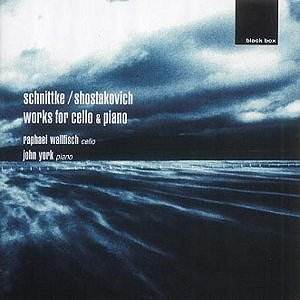This recent release from Raphael Wallfisch and John
York couples works for cello and piano by Shostakovich and the man many
regarded as his "spiritual" heir, Alfred Schnittke. The music is, with
perhaps one exception, deeply melancholic, though also often strikingly
melodic, and grips the attention from start to finish. Schnittke's often
commented upon irony and polystylism are notably absent here and his
two cello sonatas plumb emotional depths that definitely justify the
decision to showcase this music alongside that of Shostakovich.
The first sonata is a three-movement piece with two
elegiac Largos, the first short, the other much more extended,
framing a central, more agitated Presto. When taken as a whole,
it strikes me as easily some of the best music I have heard by this
composer. The five movement second sonata is, by its very nature, more
fragmented and closer to what I previously understood Schnittke to be
about. John York's illuminating notes describe it as being "starker
and stranger" than the first essay in this form and I would concur with
this assessment. The music is at times phantasmagorical and it is not
difficult to imagine the state of mind of the then seriously ill composer
when he composed it.
The main piece here representing Shostakovich is a
transcription for cello of the valedictory Op.147 Viola Sonata,
unconventionally beautiful music in this or any other setting, and without
question the utterance of an artist well aware of his impending demise.
It is also, however, at times a peaceful, almost resigned piece and,
in the final Adagio, with its quotes and allusions to much other
music, Moonlight Sonata included, provides what I can only describe
as a transcendental experience. I believe that other reviewers have
questioned its inclusion in this version but I know that I shall return
to it many times in the coming months. However, the sonata probably
ought to have closed the disc because the two slighter pieces that follow,
especially the romantic ballet Adagio (which seems to be an incongruous
inclusion anyway), gain nothing from comparison with the great emotion
that has gone before. Even in its folk inflected sections, the sonata
operates on a totally different emotional level to these makeweights
and, along with the superb second Largo of Schnittke's first
sonata, this performance makes the disc an important one and more or
less an essential purchase.
Neil Horner


